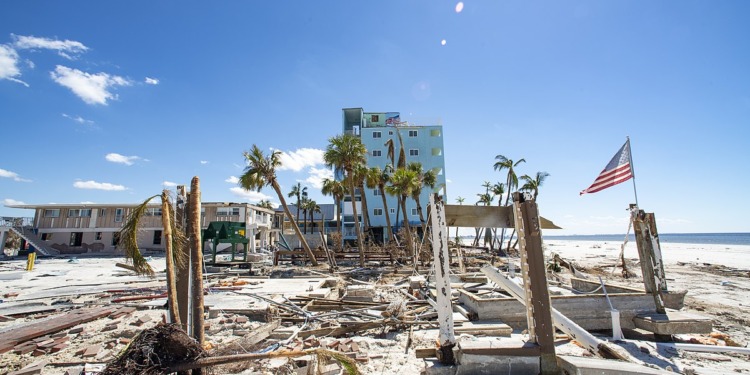Extreme weather fuelled by climate change cost the US $165 billion in 2022. The country experienced 18 separate natural disasters last year, including heatwaves, hurricanes, flooding and drought.
Hurricane Ian alone cost over $111 billion, killing at least 150 people and flattening neighbourhoods. Ian was also the second costliest insured loss since Hurricane Katrina in 2005 with losses of $50-60 billion.
With climate-related natural disasters increasing in frequency and destructive potential, insurance companies in the US are raising prices or cancelling policies altogether. As a result, homeowners in Florida, North Carolina, Louisiana, Colorado, Oregon and California have been let down after their insurers have abandoned them.
Speaking to NPR, Roy Wright, leader of the Insurance Institute for Business and Home Safety, an insurance industry-backed research group, said: “More and more Americans are frankly having mother nature barge through their front door,” adding that “change in climate comes at a price.”
Both the National Oceanic and Atmospheric Administration (NOAA) and the National Science Foundation (NSF) say they are working to create a research centre that will focus on providing the insurance industry with climate data to help them better deal with the climate crisis.
How is climate science helping insurers?
Scientists are helping insurance companies understand how often and how severe climate-fuelled natural disasters like heat waves, droughts and hurricanes are likely to be in the future. This allows insurers to adjust their businesses to better deal with the risks of providing climate insurance.
“Traditionally, catastrophe modelling looks at past events while climate modelling looks to the future,” NOAA Chief Scientist Sarah Kapnick Ph.D explains. “We need a new and improved way of combining these approaches in order to address the challenges that are being accelerated by our rapidly changing climate.”
“Combining climate and catastrophe models with the goal of producing better decision making tools is a game changer for the insurance, reinsurance and mortgage industries,” she added.
The main challenge for both scientists and insurers is that the future of extreme weather will not look like the past, perhaps making predictions too unreliable. Hurricanes are more frequent and severe than in the past and summers are getting consistently warmer each year.
“What we knew about rain and wind and wildfire in 1990, and what we knew in 2010, is useful information, but it’s insufficient to understand the risks that befall us come 2025, come 2030,” Roy Wright says. “NOAA, and the data they provide, is some of the most powerful data available anywhere in the world.”
Related Articles: How California’s Wildfires Could Put Insurers out of Business, Innovative Index-Based Agriculture Insurance: Where Hope Meets Possibility, Insuring Extreme Weather Disasters: Losing Money to Climate Change, Evidence Keeps Piling Up: Humans Worsen 71% of Extreme Weather Events
“Parametric” insurance is also being considered when it comes to helping insurance companies deal with natural disasters. This would guarantee a set payback after a natural disaster and help to build resilience in communities.
However, parametric insurance in the long term is dependent on how the affected area’s government is able to adapt to climate pressures.
In Colombia, for example, Blue Marble and Nespresso launched a parametric insurance project in 2018. Supported by the Colombian Government, the project aims to protect small-scale coffee farmers from droughts and excessive rain.
In partnership with @Nespresso, we have launched a pilot weather index insurance program that protects smallholder coffee farmers in Colombia. To learn more, visit https://t.co/nheDpsAiLt pic.twitter.com/DW38mh3w4G
— Blue Marble Microinsurance (@BlueMarbleMicro) October 3, 2018
The insurance project reaches 8,000 farming households and paid out $3 million to over 6,000 of them in 2022.
The future of climate insurance
The floods in the Emilia-Romagna region of Italy are provoking more conversations about the place of insurance in the climate crisis. The financial cost of the crisis is expected to rise to billions in Italy but insurance losses are predicted to be just a small portion of potential costs, according to Aon’s Weekly Cat Report, published on May 19.
This is because there is already a large gap in flood protection insurance in the country, insurance company Swiss Re explains. Floods are the most common natural hazard in Italy and they are also difficult to assess in terms of risk.
With natural disasters becoming increasingly more severe and frequent as a result of climate change, it is important that insurance companies keep up with the new threats this presents to property.
For people and communities affected by natural disasters, it is crucial that they are supported in adapting to the increased hazards caused by anthropogenic climate change. It is also imperative that climate insurance projects are better supported to promote a wide-scale adaptation to the climate crisis on both individual and corporate levels.
Editor’s Note: The opinions expressed here by the authors are their own, not those of Impakter.com — In the Featured Photo: Fort Myers Beach, Florida, after Hurricane Ian in 2022. Featured Photo Credit: Wikimedia Commons.










